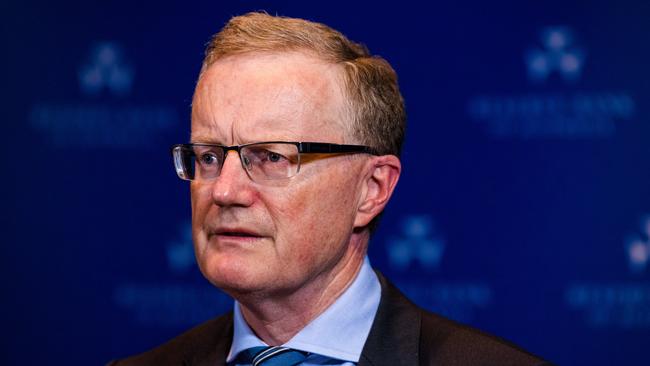Economy can defy Delta: RBA
Higher vaccination rates will free Sydney from its current lockdown by October and a sharp bounce back will return the economy to its pre-Delta trajectory as soon as March next year.

The Reserve Bank is optimistic higher vaccination rates will free Sydney from its current lockdown by October and a sharp bounce back will return the economy to its pre-Delta trajectory as soon as March next year.
With more than 15 million Australians under stay-at-home orders, RBA governor Philip Lowe also told a parliamentary committee it was “quite unlikely” the country would plunge into a double-dip recession over the second half of this year.
However, he couldn’t “rule out two quarters of negative growth if the health situation deteriorates”, and forecast “further brief (and less severe) restrictions” throughout the December quarter and limited lockdowns into 2022.
“We’ve got to traverse a difficult few months … but the experience here and elsewhere is that once the health situation is brought under control the economy bounces back quickly,” Dr Lowe said.
The RBA governor said he was “optimistic about next year”, noting that the RBA’s economists had pencilled in 4.25 per cent GDP growth in 2022 – faster than the 3.5 per cent rate estimated in May.
The bank’s “central scenario” underpinning its latest set of forecasts – released in Friday’s Statement on Monetary Policy – assumed “some limited lockdowns next quarter and some next year” as increased vaccine take-up allowed the country to operate more openly with Covid.
The latest estimates showed the economy growing by 4 per cent this year – weaker than the 4.75 per cent predicted in May. But the RBA’s statement said under the most likely scenario, despite the hit from Delta, “output and employment are expected to have returned to their previously anticipated paths by early next year”.
Private sector economists warned that the central bank was underplaying the damage from lockdowns. CBA head of Australian economics Gareth Aird said the forecasts implied only a 1 per cent contraction in the September quarter, followed by a robust 2.4 per cent snapback over the following three months.
In contrast, Mr Aird – who assumed restrictions in Greater Sydney “were not eased in any material sense” until the middle of the December quarter – estimated GDP would slump by 2.7 per cent this quarter, followed by a more meagre recovery of 1.9 per cent in the next.
“We broadly share the RBA’s optimism about the economy over the medium term,” Mr Aird said. “But we are more concerned about the economy over the near term, and think that it will take a while to regain economic momentum again once lockdowns are over.”
The central bank forecasts for inflation were little changed, at 1.75 per cent by the end of next year. The RBA does, however, see consumer price growth pushing above the bottom of its 2-3 per cent target range by December 2023 – something not achieved since 2015.
Dr Lowe maintained the conditions to justify a rate rise were unlikely to be achieved before 2024.
“It will not be enough for inflation to just sneak across the 2 per cent line for a quarter or two,” he said. “We want to see inflation well within the target band and be confident that it will stay there.”
He dismissed worries that inflation would get out of hand, saying “with wage growth of two-point-something we aren’t going to have an inflation problem”. The great strides made in returning employment to pre-pandemic levels are threatened by the Greater Sydney lockdown, which has already seen tens of thousands of workers stood down in the country’s largest city.
The RBA’s new set of forecasts showed unemployment would end the year around its current 5 per cent. It would then track steadily lower to 4.25 per cent by the end of 2022, versus a previous estimate of 4.5 per cent, before reaching 4 per cent by the close of 2023.
Dr Lowe said “self-interest” would motivate businesses to hold on to staff through lockdowns and argued that firms would be contemplating the “likelihood they will (again) be complaining of not being able to find workers with the appropriate skills”. With low rates sparking a national borrowing binge among homebuyers desperate to get into a hot property market, Dr Lowe also said he could not rule out regulators taking action to curb excessive household credit growth over the coming year.




To join the conversation, please log in. Don't have an account? Register
Join the conversation, you are commenting as Logout